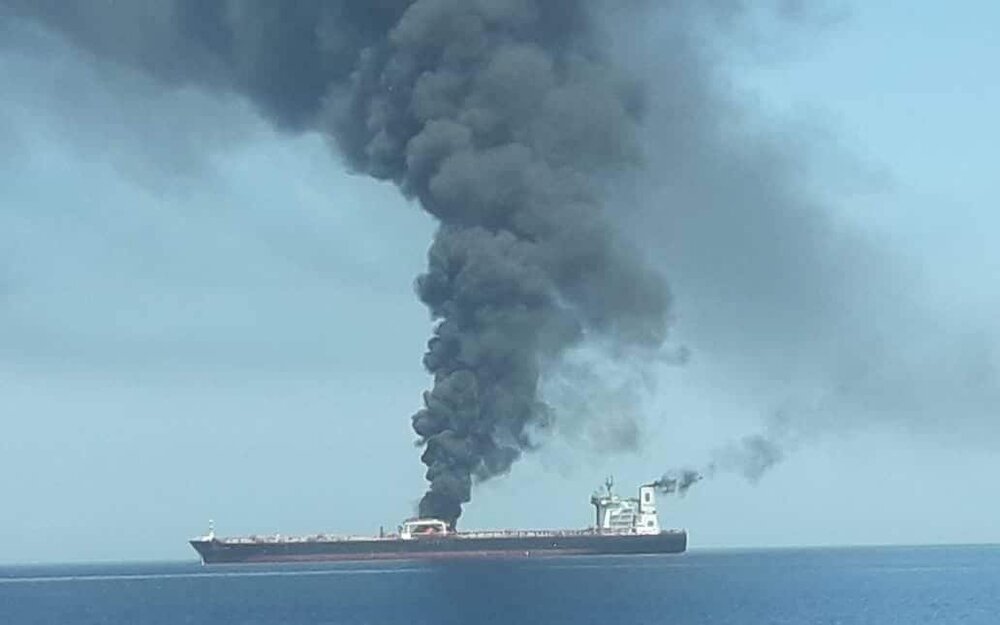Iran calls suspicious nature of attacks on oil tankers ‘alarming’

Just over 12 hours after reports broke in slumbering Washington about the new crisis in which two ships were left ablaze forcing their crews to abandon their posts, Pompeo appeared in the State Department Briefing Room to significantly raise the stakes.
“It is the assessment of the United States government that the Islamic Republic of Iran is responsible for the attacks that occurred in the Gulf of Oman today,” Pompeo said.
He cited intelligence, weapons used, the required expertise and sophistication of the assault and previous attacks to conclude it was the latest assault by Iran on “freedom-loving nations.”
Pompeo offered no evidence for his accusations. He did not allow questions so journalists could challenge his assertions. And his decision not to allow a few days to elapse for a full investigation left no doubt about U.S. intentions.
“The Islamic Republic of Iran is responsible for ensuring the security of the Strait of Hormuz, and we showed this by rushing to save the sailors of the incident-hit vessels in the shortest time possible.”
He left the room after warning the “United States will defend its forces, interests, and stand with our partners and allies to safeguard global commerce and regional stability.”
Iran’s Foreign Minister Mohammad Javad Zarif took to the twitter shortly after to dismiss Pompeo’s accusations.
“That the US immediately jumped to make allegations against Iran—w/o a shred of factual or circumstantial evidence—only makes it abundantly clear that the #B_Team is moving to a #PlanB: Sabotage diplomacy—including by @AbeShinzo—and cover up its #EconomicTerrorism against Iran,” Zarif tweeted.
“B-team” is a coinage of Zarif and comprises of U.S. National Security Adviser John Bolton, Israeli Prime Minister Benjamin Netanyahu, Saudi Crown Prince Mohammed bin Salman and Abu Dhabi Crown Prince Mohammed bin Zayed Al Nahyan, who pursue regime change in Iran.
Zarif added, “I warned of exactly this scenario a few months ago, not because I'm clairvoyant, but because I recognize where the #B_Team is coming from.”
The Foreign Ministry spokesman also issued a statement, where he said the suspicious nature of the attacks is not funny or ridiculous but “alarming”.
The attacks on the two ships happened near the Strait of Hormuz, a major strategic waterway through which about one-fifth of global oil consumption passes on its way from Persian Gulf producers including Saudi Arabia, Iraq, the UAE and Kuwait as well as Iran.
“The Islamic Republic of Iran is responsible for ensuring the security of the Strait of Hormuz, and we showed this by rushing to save the sailors of the incident-hit vessels in the shortest time possible,” Foreign ministry spokesman Abbas Mousavi said in a statement.
“While the Japanese prime minister is meeting with Iran’s top leader to discuss ways to ease regional tensions, which clandestine hands have been at work to undermine such efforts and who benefits from that?” the Iranian Foreign Ministry spokesman asks.
“Pinning the blame on Iran for the suspicious and regrettable incident for the oil tankers seems to be the easiest and most simplistic thing Pompeo and other American statesmen could do,” Mousavi said, the Foreign Ministry website reported.
“While the Japanese prime minister is meeting with Iran’s top leader to discuss ways to ease regional tensions, which clandestine hands have been at work to undermine such efforts and who benefits from that?” the spokesman asked.
“Mr. Pompeo! The suspicious nature of incidents for oil tankers is not a joke. It is not only not funny, but it is also worrying and alarming,” Mousavi added.
Still on another front, Iran categorically rejected as “unfounded” U.S. claims that it is responsible for the attacks, warning of “another Iranophobic campaign” being waged by Washington and its allies.
“The inflammatory remarks by the U.S. representative against Iran at the UN Security Council on 13 June 2019 was another Iranophobic campaign. Iran categorically rejects the U.S. unfounded claim with regard to 13 June oil tanker incidents and condemns it in the strongest possible terms,” said the Iranian mission to the UN in a statement on Thursday.
“Neither fabrications and disinformation campaigns nor shamelessly blaming others can change the realities. The U.S. and its regional allies must stop warmongering and put an end to mischievous plots as well as false flag operations in the region. Warning, once again, about all of the U.S. coercion, intimidation, and malign behavior, Iran expresses concern over suspicious incidents for the oil tankers that occurred today,” the statement added, according to Press TV.
On Thursday morning, Iranian rescuers rushed to the assistance of the two oil tankers in the Sea of Oman, transferring all of their 44 crew members to Iran’s southern shores.
Referring to Washington’s sanctions against Tehran following the former’s unilateral withdrawal from the 2015 Iran nuclear agreement with world powers, the statement said, “The U.S. economic war and terrorism against the Iranian people as well as its massive military presence in the region have been and continue to be the main sources of insecurity and instability in the wider Persian Gulf region and the most significant threat to its peace and security.”
The statement also called on “the international community to live up to its responsibilities in preventing the reckless and dangerous policies and practices of the U.S. and its regional allies in heightening the tensions in the region.”
It added that the recent developments in the region “serve as proof of the urgency” of engaging in “dialogue based on mutual respect” between “all regional countries... based on mutual respect, inclusivity and basic principles of international law.”
“Reiterating its longstanding position on the need for promoting peace and security in the broader Persian Gulf region, the Islamic Republic of Iran stands ready to play an active and constructive role in ensuring the security of strategic maritime passages as well as promoting peace, stability and security in the region,” the statement said in conclusion.
Source:TehranTimes
















